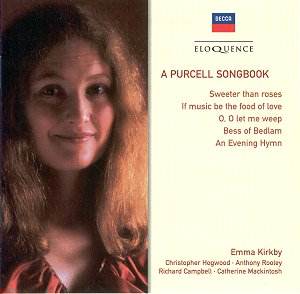
Henry PURCELL (1659-1695)
A Purcell Songbook
Hark! Hark! How all things [1.43]
Crown the altar, deck the shrine [2.28]
If music be the food of love [3.25]
Not all my torments [1.58]
O, O let me weep [6.32]
I attempt from love's sickness to fly [1.20]
Olinda in the shades unseen [1.03]
Urge me no more [3.17]
Bess of Bedlam [3.43]
Lovely, lovely Albina [2.10]
Sweeter than roses [3.12]
Dear pretty youth [1.55]
When first Amintas sued for a kiss [1.55]
The cares of lovers [1.47]
Ye gentle spirits of the air [1.50]
An evening Hymn [4.17]
![]() Emma Kirkby (soprano);
Christopher Hogwood (organ and spinet); Richard Campbell (viola da gamba);
Catherine Mackintosh (violin); Anthony Rooley (lute)
Emma Kirkby (soprano);
Christopher Hogwood (organ and spinet); Richard Campbell (viola da gamba);
Catherine Mackintosh (violin); Anthony Rooley (lute)
Rec. Forde Abbey, October 1982. DDD
![]() DECCA ELOQUENCE 476
7467 [46.09]
DECCA ELOQUENCE 476
7467 [46.09]
AVAILABILITY










